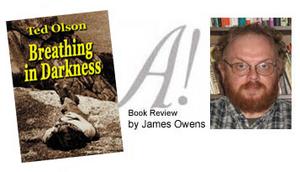

Breathing in Darkness (Wind Publications, 2006)
Ted Olson's poems often unfold in a dark world - be it in literal darkness or the obscurity brought on by the effects of time or simply by a failure to see - but they open out toward light.
The voice of Olson's best work is bemused or saddened as the poet looks around at life and its ambiguities, yet it is also the voice of a pilgrim, a traveler always alert to catch the bright, brief sparks of insight that ignite the soul. The compact imagery of Sunburst,"which comes early in Breathing in Darkness, perhaps provides a metaphor for the work of this poet:
This evening,
while fishing,
having caught
nothing,
I cursed
the dark
water,
then walked off
into the flaming
stream....
Ted Olson should be a familiar name to readers of Appalachian literature and students of Southern Culture. A professor at East Tennessee State University, Olson has written or edited numerous books, including the influential series CrossRoads: A Southern Culture Annual and a previous collection of poetry, So Far: Poems (Creeker Press, 1994). For many years he has performed traditional and contemporary American, British, and Irish songs, ballads, and stories at educational and entertainment venues.
The history and present life of Appalachia shape many of Olson's poems. The speaker of Looking for Deer, the longest poem and one of the most successful in Breathing in Darkness, has returned briefly to his boyhood home, just long enough to sell the land to developers - or, as he puts it, to sign the property's "death-warrant." The visit recalls memories of the night when, as a boy, he met a deer in the woods at night, an encounter that seems fraught with portent:
I reached
in my knapsack
for my flashlight,
turned it on,
aimed it...
and right there,
blocking my path,
was a buck,
its antlers aimed
at me;
mesmerized by the rays
of my fake sun,
the buck was frozen,
its eyes glowing
like spaceships.
Not finding any deer, the speaker leaves the land to go and meet the purchasers who will fill it with "suburban houses / and a golf course," the speaker decides not to tell them about this remembered meeting with the tutelary spirit of the place "where I ran / as a child," because it is, perhaps, too late now to change the destiny of nature in the modern world.
Still, resignation before fate is not the end of Looking for Deer, as it is never the end for any of the poems in this book The poet holds out hope of a restorative vision, almost mystical, something like the work of poetry itself:
...maybe
when this place
is no more
than a city,
its population
disabled from
being unable
to see beyond
gray walls,
I'll return....
then I'll sit down,
close my eyes,
let my mind
wander...
there-
I can see it
now:
a buck just jumped
out of that darkness
like a spark....
Many of these poems return to other themes that thread their way through the book: difficult relations between fathers and sons, the disappearance of regional ways of life, love. A lot of Olson's poems are short and imagistic, almost Japanese in their sensibility (except for some flashes of sardonic wit), such as TVA Blues, which skillfully contrasts the vivid life of memory with the harsh changes wrought upon the landscape by "progress":
The last place
we made love-
on an exposed rock
in a wild river-
is now under water,
at the bottom of
this damned lake.
Breathing in Darkness is one of those books that readers will want to shelve in a handy spot, so that they can return to it over and over. We need Ted Olson. In his truest voice, he is a visionary poet, restlessly prying at the dim everyday with the shiny edge of intelligent illumination. His poems locate the connections and epiphanies, right there where they have always been, unseen until now and waiting for the right eye to find them, the right tongue to give them clarity and form. Breathing in Darkness does just that.
About the Reviewer: James Owens grew up in Dickenson County, Va. He currently teaches at Valparaiso University in Indiana. His poems, book reviews, and other writing appear in a wide variety of literary journals. He was the editor of the Sow's Ear Poetry Review (2000-2003). A former copy editor at the Bristol Herald Courier, he graduated from King College and earned an MFA in creative writing from the University of Alabama.